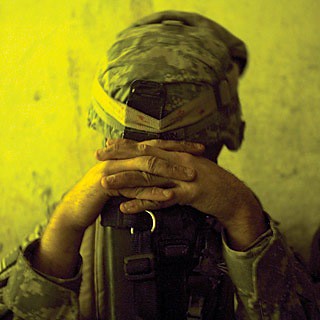
I just finished reading Erica Goode's Times story on the suicides of four soldiers who served together in a small North Carolina-based Guard unit in Iraq from 2006 to spring 2007. This is a witheringly painful story. Goode, who has done quite a bit of science writing as well as substantial reporting from Baghdad, tells it with an unusual freshness of perspective and clarity of vision.
She starts where I suppose she must:
But this isn't another routine PTSD story. Though an IED explosion that killed two comrades near the end of the unit's deployment plays a large role, Goode doesn't bolt the men's distress down to standard-narrative reactions to this traumatic event. By acknowledging early and outright the complex multiple problems that faced these men both in Iraq and back at home, she adds dimension to their lives -- and gives a cleaner look at the forces that drove them to end them.
And so it was with these soldiers. Their problems are multifaceted, self-compounding, and brutally stubborn.Do read the story.It's long for a news story, but it doesn't seem so. It reads short -- but you know you've been somewhere.
I want to point out a couple central issues this story raises, at least implicitly, but which need far more attention in public and policy discussions.
The first is the spectacular failure of the military's predeployment screening. Why -- why o why o why -- are we deploying people whose mental state and/or histories clearly suggest they're poor candidates for weathering its stress? Of the four soldiers who committed suicide, two seem to be easily identifiable as poor candidates to send into a combat zone.
The more obvious case is Blaylock, whose suicide is described above. Blaylock had actually been discharged from the military in 2002 for a personality disorder. But in 2005, when we were short on troops, he was activated and deployed even though, as Goode reports,
This is just stunning.
Meanwhile, Blaylock's comrade Sergeant Roger Parker had a history of bipolar disorder in his immediate family. a well-known significant risk for that very difficult disorder. Conceivably the military didn't know this. But if they knew -- hoo boy.
The military has made various excuses for not screening out more soldiers with the sort of mental -health vulnerabilities that Blaylock and Parker had. But as I wrote a few weeks ago, in "What if you could predict PTSD in combat troops? Oh, who cares...," a major study by DOD researchers suggests that we already have tools and the data to readily screen out and divert from combat at least half the soldiers who end up with PTSD and other post-combat mental illness rates (and presumably, their accompanying suicides).
The other question I wish Goode's story had addressed -- and possibly she wanted to but lacked room, for the story is unusually long as is -- is why the VA does so poorly at treating these soldiers. Granted, psych disorders are hard to treat. But despite pouring billions into the VA's PTSD system over the last 25 years or so, we don't have nearly as much information on either the nature of effectiveness of the VA's methods as we should -- and what data we have shows the VA gets poor results. As I noted in my SciAm article,
Right now we're hosing money at the VA to treat PTSD, and there's little evidence we're getting much for it. The VA has some dedicated, skilled therapists (and some not so good.). But their efforts are undermined by bureaucratic, cultural, and structural problems that are going willfully ignored, while ideas to solve some of the most obvious, such as restructuring the disability system to create stronger incentives to heal, meet fierce and dismissive resistance. As my story points out, the overdiagnosis of PTSD in people with other problems has so overloaded the system that it can't give the attention it needs to give to the genuinely and deeply distressed. There are hints in Goode's story that such failures might have played a role in some of the men in her story.
So at the front end, the DOD is sending to war soldiers who obviously shouldn't be sent. And at the back end, awaiting soldiers who return, is a VA response that is clearly wanting.
This ain't working.
I'm now reading Tom Ricks' The Gamble, about the surge in Iraq. We won't know how well the surge really worked until we leave. But one thing the book makes clear: When it finally became deadly obvious to even George W. Bush that Rumsfeld and Co's approach in Iraq was failing, there was enough of an opening even in the echo chamber around W that a few people with alternative ideas -- most notably David Petraeus and retired General Jack Keane -- could gain his ear, expose some faulty assumptions, displace those who had stubbornly pushed a strategy based on those assumptions even as it was clearly failing, and bring some fresh thinking and better tactics to bear.
Our current approach to post-combat distress is failing just as completely as the Rumsfled approach did. But in the halls that count, there's no sign of any change in thinking.











